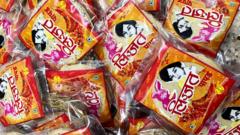Founded by seven housewives in Mumbai, Shri Mahila Griha Udyog Lijjat Papad has grown to over 45,000 women members across India, revolutionizing their lives through home-based snack production. This cooperative not only provides financial independence but also fosters a sense of community and respect among its members.
Empowering Women Through Snack Production: The Lijjat Papad Journey

Empowering Women Through Snack Production: The Lijjat Papad Journey
The story of Shri Mahila Griha Udyog Lijjat Papad highlights the transformative power of a women's cooperative that has impacted thousands of Indian lives since its inception in 1959.
On a brisk December morning in Delhi, a vibrant gathering of women clad in colorful saris and warm shawls congregated outside an unassuming three-storey structure. Inside flourished one of India’s longest-standing women-run social enterprises, known as Shri Mahila Griha Udyog Lijjat Papad. Established in 1959 in Mumbai by seven visionary housewives, the cooperative specializes in crafting papad, a beloved crispy snack integral to Indian cuisine.
Decades down the line, this cooperative has expanded its reach across India, now boasting over 45,000 women members and generating an impressive yearly turnover of 16 billion rupees (approximately $186 million). Not only do they cater to the domestic market, but they also export their products to international destinations like the UK and the US.
Many women in this cooperative relish the opportunity to generate income while managing their household responsibilities. Lakshmi, a 70-year-old manager of the Delhi center, joined the cooperative nearly forty years ago after facing personal adversity. “I hadn’t finished my studies and didn’t know what else to do,” she recalls. But her involvement with Lijjat became a turning point, allowing her to support her family while finding a meaningful role in her community.
Each day, women flock to their local Lijjat center to pick up pre-mixed dough made from lentils and spices. They skillfully roll out papads at home, often multitasking with their household duties. Lakshmi reminisces about her initial struggles in this process, noting that she has now honed her skills to produce 1 kilogram of dried papad in just thirty minutes.
The cooperative's journey began during the 1950s in a newly independent India, a time when women faced significant challenges within a patriarchal society. The founding group of women—Jaswantiben Jamnadas Poppat, Parvatiben Ramdas Thodani, Ujamben Narandas Kundalia, Banuben N Tanna, Laguben Amritlal Gokani, Jayaben V Vithalani, and Diwaliben Lukka—sought out to support their families by leveraging their culinary talents.
Financial backing was scarce, but with a loan of 80 rupees from social worker Chhaganlal Karamshi Parekh, they took their first step. After overcoming initial hurdles in product sales, the cooperative began to find success, leading to the inclusion of more women, who empowered themselves as co-owners of the business, fostering a strong sense of sisterhood.
President Swati Paradkar emphasizes the cooperative’s unique structure: “Even though I am the president, I am not the owner. We are all co-owners, sharing both profits and losses.” This democratic ethos has been pivotal to their enduring success.
The brand name Lijjat, meaning "taste" in Gujarati, was created in 1966 following a suggestion from a cooperative member in response to an advertisement for name ideas. Over the years, Lijjat has paved the way for countless women to achieve financial autonomy, proving that community and collaboration can indeed change lives.
Lakshmi proudly shares the fruits of her labor: “Today, I have put my children through school, built a house, and got them married. Working here, I have found not just an income but respect.”




















